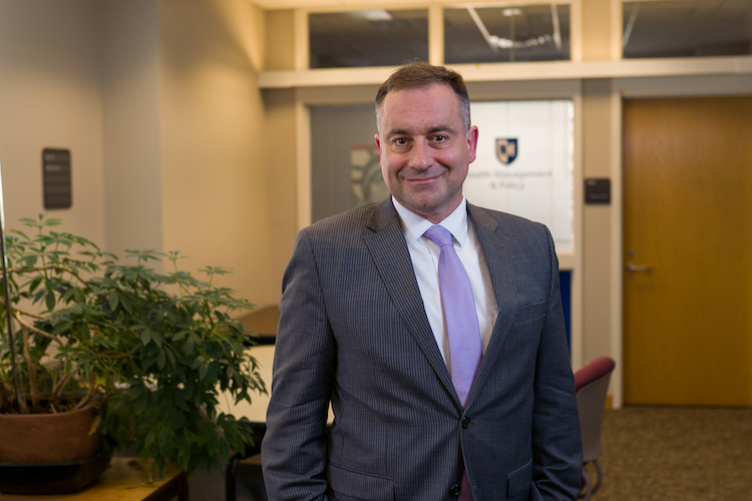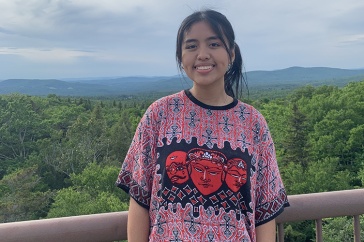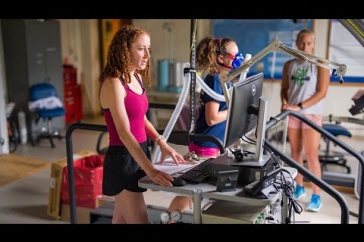
Editor's Note: This is the latest in a series featuring UNH faculty telling their stories in their own words.
Mark Bonica, assistant professor health management & policy
"My father immigrated from Sicily when he was 11. He ended up dropping out of high school when he was 17 to join the Navy and was sent to Vietnam. After he got out, he worked at Raytheon. My mother was his high school sweetheart. She told him he could do more and pushed him to get his high school diploma.
By the time I was born, my father was headed to UMass on the GI Bill. Then he went to UMass Medical School. After he graduated, we moved back to the Boston area so he could do his residency.
School stopped working for me when I was pretty young. The only thing I did well in was English. I always liked writing and wanted to be a storyteller. In college, I majored in philosophy and English. I imagined myself being an English teacher by day and a novelist by night. As the son of a father of hard science, that didn’t go over well. At the time, we didn’t get along. (We get along great now.)
To read questions asking how we should live our lives, what is the right way to live — I thought that was the coolest thing.
During my sophomore year of high school, I had a great English teacher, Tim Dunn. When I showed him my writing, he was very encouraging. He believed in me when a lot of people didn’t. He was a poet and a Vietnam-era vet; I kind of wanted to be Tim Dunn when I grew up.
I read Plato’s “The Republic” when I was a senior and was really inspired. To read questions asking how we should live our lives, what is the right way to live — I thought that was the coolest thing. As an arrogant young man, I decided I’d go to college and figure it out.
But I didn’t want to depend on my father to pay for it. At UMass, I had an RA who told me that if I joined the Army National Guard, the state of Massachusetts would waive my tuition. I thought it would pay for school while making me a better person. The Army had a sense of ethics; I admired the culture, the leadership, courage and discipline. Plato had said citizens should be soldiers first. I joined the Army National Guard as an infantryman and became an RA and was independent of my parents. I did basic training between my freshman and sophomore years.
Back at school, I was taking a creative writing class and some 20-year-old kid said I wasn’t very good, so I stopped writing. My dreams weren’t coming together exactly as I thought they would, though. I knew I needed to grow up some; I still wasn’t sure what I wanted to do. I had an ROTC scholarship for my last two years, and the professor of military science suggested I take an active duty commission when I graduated and learn a practical skill; I’d go in as a lieutenant and after officer basic, become a platoon leader. So that’s what I did. I was very lucky to be commissioned as a medical service corps officer.
I met my wife, Kandie, in high school. We got married three weeks after I graduated from UMass. My first assignment was in El Paso as a practice manager for a large clinic. After about 18 months, I was reassigned as a medical platoon leader for a cavalry (tank) squadron. I had 36 medics working for me; I was 24 years old.
Originally, I was going to do three years in the Army. I ended up doing 23. Along the way, I started working on my MBA but realized very quickly I liked finance and accounting better. To me, it was another way of storytelling — business people were also answering the question, how should one live and lead? I went to school at night, worked my Army job during the day and got a master’s degree in finance.
I worked in finance for a number of years, including stints as a chief financial officer for two Army hospitals. Then the Army gave me the opportunity to get my Ph.D. in economics at George Mason University. I taught economics and finance at Army-Baylor MHA in San Antonio. I loved teaching. I still remember the first time I stepped up to the podium; it was a dream come true. I taught in the program for four and a half years and then started thinking about moving on.
I retired as a lieutenant colonel. I was planning to leave Army-Baylor and go to the Pentagon and run the Army’s healthcare analytics program. Then my boss got a recruitment letter from UNH for assistant professors in health management. He said, ‘You should apply.’ I took the letter home, and my wife — she’s from Keene, New Hampshire — saw it and asked if I was going to apply. When I said no, she said, ‘I’ve been following you all over the country for 23 years. I want to go home.’ So, I applied, and here I am. "
Bonica still thinks teaching is a dream come true and welcomes the chance to help students answer that critical question — "how should one live and lead?" — while teaching them about health care systems and health, economics and other course subjects.



















































